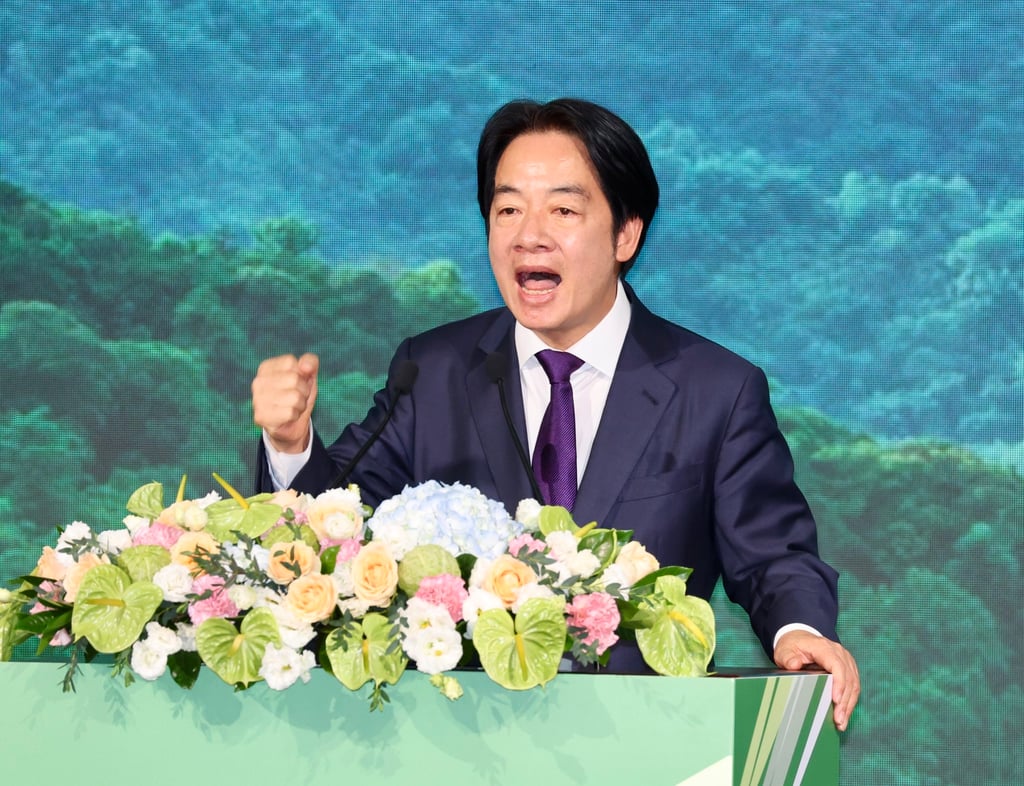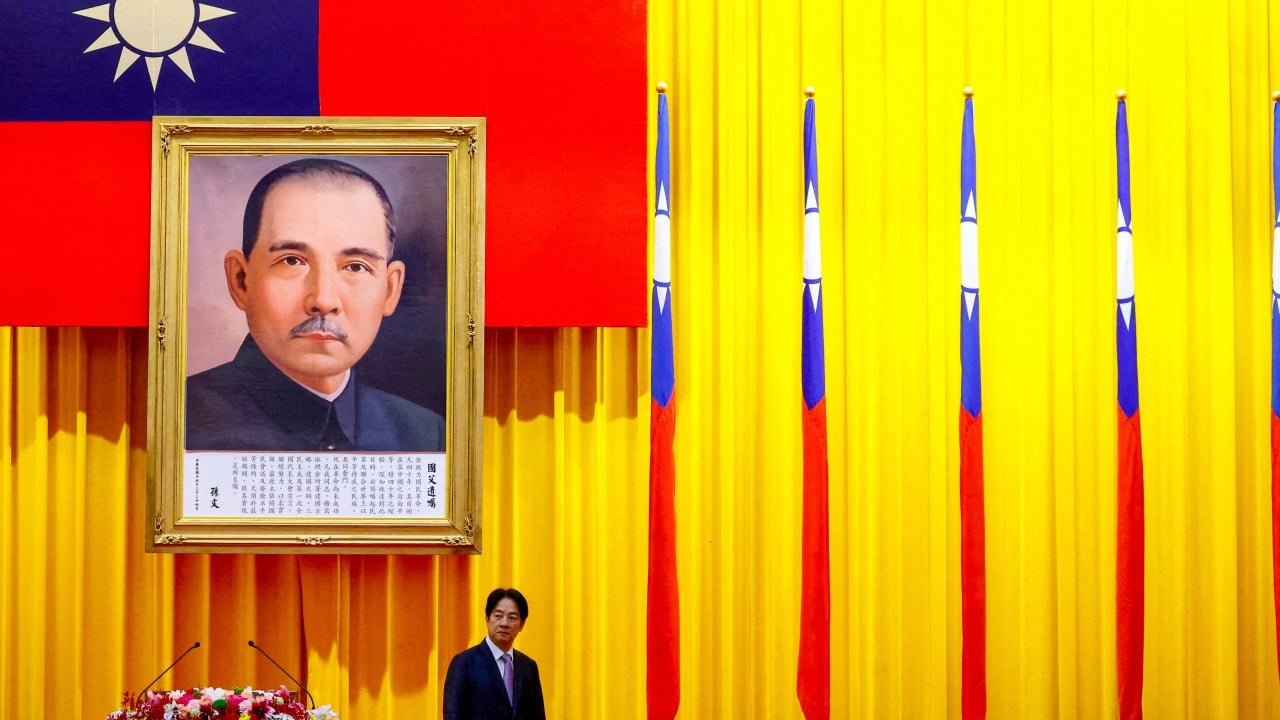Early into his tenure as Taiwan’s new leader, William Lai Ching-te has signalled he will push for the development of a Taiwan-centric identity to stand against Beijing, according to analysts, though they say he is unlikely to officially declare independence.
During the Democratic Progressive Party (DPP) congress on July 21, Lai, who took office in May, called for Taiwanese people to identify with the island and to do away with the belief that Taiwan could serve as a base to “reclaim” the Chinese mainland.
“Our predecessors shed blood and risked their lives to expose the fallacy that ‘Taiwan is a base for reclaiming the mainland’ and set a national direction that places Taiwan front and centre,” said Lai, who is head of the independence-leaning DPP.
The remark was a reference to a long-abandoned plan by the Nationalist leader Chiang Kai-shek to “recover” the mainland after his Kuomintang (KMT) forces lost a civil war with the Communists and fled to the island in 1949 to set up an interim government.
Before he died in 1975, Chiang had vowed to use Taiwan as a “recovery bastion” to one day retake the mainland – a mission that was abandoned after his son Chiang Ching-kuo succeeded him and concentrated on the island’s development.
Speaking entirely in Taiwanese rather than Mandarin, which is commonly used on both sides of the Taiwan Strait, Lai said the DPP must devote itself to “ensuring that all citizens recognise Taiwan’s history and culture”.
“We must establish a national identity that the 23 million people living in Taiwan share a common destiny,” he said.
“Now, our responsibility is to unite the people, resist annexation, and safeguard national sovereignty.”
In response, Beijing condemned Lai for “openly advocating for the establishment of a so-called national identity on the island”.
“This once again exposed his true colours of stubbornly adhering to the position of ‘Taiwan independence’ and carrying out separatist activities on the island,” said Chen Binhua, a spokesman for the mainland’s Taiwan Affairs Council (TAO), on Monday.
Beijing sees Taiwan as part of China, to be reunited by force if necessary. Like most countries, the United States does not recognise Taiwan as independent but opposes any attempt to take the island by force and is committed to supplying it with weapons.
Cross-strait relations have worsened since Lai was elected in January. Beijing has labelled him an “obstinate separatist” whose leadership would bring war to Taiwan.
In a news conference in Beijing on Wednesday, TAO spokeswoman Zhu Fenglian also hit out at Lai and the DPP for emphasising the Taiwanese dialect over Mandarin in an effort to cut the island’s historical links with the mainland.
“This is another farce by the DPP authorities in their deliberate attempt to promote ‘de-sinicisation’,” she said of Lai’s speech in Taiwanese and a proposal by his government to rename the local dialect the “language of Taiwan”.
Zhu said the “so-called Taiwanese language” was actually the Minnan or Hokkien dialect, brought to Taiwan by people from the mainland’s southeastern province of Fujian.
People on the island commonly refer to the local dialect as Minnan, the name of a group of languages originating in southern China – the most widely spoken of which is Hokkien.
Lai’s government has proposed renaming the local tongue the “Taiwanese language” – a largely symbolic move that would not change which languages are taught in schools or used in public services on the island.

In Taipei, opposition lawmakers slammed Lai for trying to use the Taiwanese identity to divide the island.
“Lai’s so-called ‘Taiwan first’ is essentially prioritising his own ideology,” said KMT lawmaker Lo Chih-chiang.
“Anyone who does not agree with his definition of national and cultural identity is seen as a source of disunity and as supporting the annexation of Taiwan by Beijing.”
However, Wu Szu-yao, a DPP legislative caucus leader, said Taiwan was a free society and its people could choose their preferred language for public discourse.
“Regarding the national identity Chairman Lai has mentioned, some people have interpreted it as the Taiwanese identity, while others have seen it as the Republic of China (ROC) identity,” she said, using Taiwan’s official name for itself.
“Our country is both Taiwan and the ROC. It is the joint responsibility of all parties, regardless of political affiliation, to uphold it.”
Analysts said Lai’s latest remarks were highly sensitive and the latest in a series of provocations since his May 20 inauguration address irked Beijing.
In the inauguration speech, Lai declared that Taiwan and the mainland were “not subordinate to each other”. The declaration prompted Beijing to launch two days of large-scale military drills around the island, simulating a blockade.
Although Lai is unlikely to declare de jure independence for the island, analysts said he is continuing efforts his predecessor Tsai Ing-wen started to develop the Taiwanese identity, but it was unclear how far he would take the project.
“Lai is unlikely to go further than Tsai on the issue of de jure independence for Taiwan as the change of status would lead to war,” said Ho Chih-yung, a professor of general education at National Tsing Hua University in Hsinchu, south of Taipei.
“Lai has already made it clear that the ROC – which is different from the People’s Republic of China – is already sovereign and independent, and so there is no need for him to declare de jure independence for Taiwan,” Ho explained.
Ho said that at least in his first four-year term, Lai would maintain this bottom line to avoid provoking Beijing.
Huang Huei-hua, head of research at the Taiwan International Strategic Study Society, a Taipei think tank, suggested that Lai would make bigger efforts to promote a Taiwanese identity in handling cross-strait relations.
“By establishing a nationalistic identity centred on Taiwan, Lai hopes to outdo Tsai in better developing the public’s sense of belonging purely to Taiwan,” she said, adding that this could also “undermine China’s efforts to deepen cross-strait integration if people here increasingly identify with Taiwan and find Beijing’s unification plan unacceptable”.
She said Lai’s assertion that Taiwan and the mainland were not subordinate to each other and his government’s plan to rename the Minnan dialect as the Taiwanese language all had the same purpose: cutting off the cross-strait historical link.
“To construct genuine Taiwanese nationalism, de-sinicisation is essential. De-sinicisation can create a natural separation between Taiwanese and Chinese people as there are no profound historical roots between them,” Huang said.
By redefining the Minnan dialect as the language of Taiwan, it may also further distinguish the Taiwanese identity from that of people from mainland China, Huang said.
“This is a step towards strengthening Taiwanese self-identity, with the goal of enhancing national unity and self-recognition,” she said.
Huang suggested that the Lai government would “push for more measures that deepen Taiwanese consciousness, which China is certain to oppose, leading to increasingly tense cross-strait relations in the future.”
Tso Cheng-dong, a professor of political science at National Taiwan University in Taipei, said it had long been a DPP strategy to promote Taiwanese identity and eventually wipe out the cultural and historical Chinese identity advocated by the KMT.
“So what Lai said about establishing a Taiwanese identity and a shared destiny is merely meant for the locals, especially the hardline pro-independence supporters, rather than trying to stoke cross-strait tension,” he said.
Recent opinion surveys show that more than 60 per cent of people on the island identify as “Taiwanese”, while just under 3 per cent see themselves as “Chinese”.
Tso said some individuals were pushing for the Taiwan independence movement and denying the ROC. “This is actually the real crisis for Taiwan,” he added.
Alexander Huang Chieh-cheng, a professor of international relations and strategic studies at Tamkang University in New Taipei, said that theoretically, given the current state of US-China relations, it was “in Washington’s interests to proactively maintain peace and stability in the Taiwan Strait and discourage Lai from playing brinkmanship with Beijing on the sovereignty issue”.
“Though there might be American friends who want to play the ‘Taiwan card’ against, if not intimidate, Beijing to the degree short of military conflict, conventional wisdom would assume that the US will forcefully exercise its influence over Lai so the cross-strait tension will not be out of Washington’s control,” he said.
However, the US itself is busy with an unprecedented election following President Joe Biden’s withdrawal from his re-election campaign, the professor said.
“Options for Washington are limited at the moment,” he said.
“The danger for Taiwan and Washington is not whether Lai will push the independence envelope. The danger is that no one knows who will and can define what the envelope is and under what kind of circumstance.”


